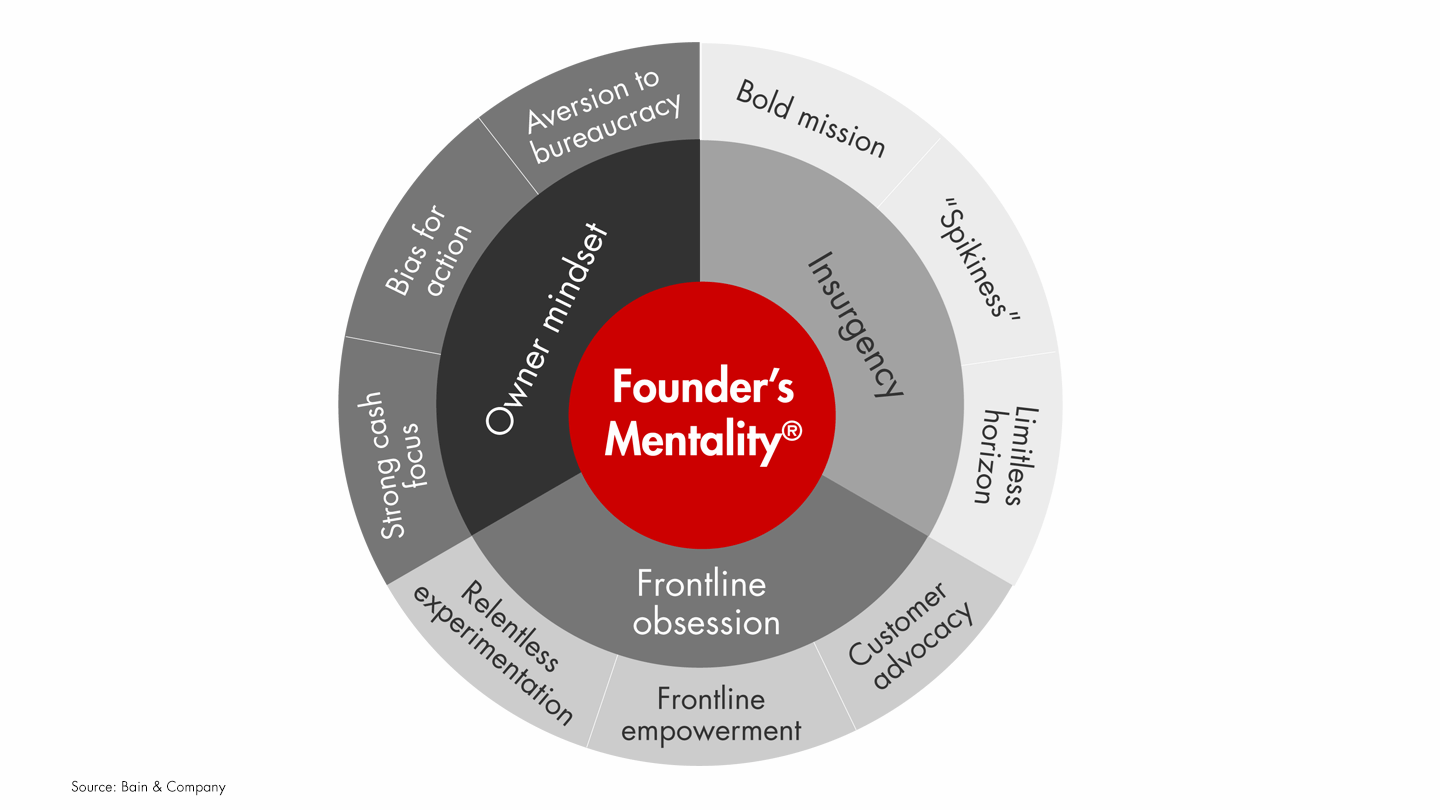Founder's Mentality Blog
We define companies with high Founder’s Mentality as those with an extraordinary sense of insurgency, a frontline obsession and an owner mindset. Each of these characteristics contains its own sub-elements (see Figure 1), where we truly see the Founder’s Mentality come to life.
The most sustainably profitable companies nurture and maintain three traits


Frontline obsession is evident in three ways at companies with high Founder’s Mentality:
- These companies constantly translate strategy and organizational decisions into frontline routines and behaviors in order to serve customers better and earn customer advocacy and loyalty.
- The leaders obsess about the key players in their organization who deliver the value to customers and ensure that these people are the “heroes.” Leaders do not allow organizational layers or complexity to distract them from this focus on the talent that really matters. Frontline empowerment is a top priority—these companies give their people the authority and resources they need to do what it takes to serve customers better.
- This leads to relentless experimentation—hundreds of experiments by customer-focused, empowered employees continually innovating and working with their customers to devise new solutions, better service and better products.

About the Founder's Mentality
The three elements of the Founder's Mentality help companies sustain performance while avoiding the inevitable crises of growth.
Let’s take a deeper look at the first of these features of frontline obsession: customer advocacy.
Leaders of companies with high Founder’s Mentality completely understand the economics of customer loyalty and advocacy. They used to remember every customer by name, but as the company grows, this becomes impossible. But they are obsessed with making sure that someone knows every customer by name and is looking out for them at all times. One great example of this is the Oberoi Group, a leading luxury hotel company in India.
In previous posts we’ve interviewed Vikram Oberoi, chief operating officer and grandson of the Group’s founder, but given that a company’s focus on customers ultimately translates into what the front line does, let’s instead revisit our conversation with Poornima Bhambal, assistant manager of the front office at the Oberoi Udaivilas in Udaipur. Here’s Poornima discussing how Oberoi’s customer focus permeates all levels of the company:
“What surprised me most in joining the Oberoi Group was the service culture. … Essentially, we try to say yes to our customers 99% of the time. We all believe that all our guests must leave the hotel happy, and as managers we have to live by example all the time. If tables need clearing up at the restaurant because guests are waiting, you’ll see our senior managers jumping in to help. When we have a big tour group check in, all of us take on porter duties or whatever is required to treat each guest individually.”
She also told me about the empowerment program that encourages all employees to do what it takes to delight customers—and gives them access to small amounts of money in order to do so. “We love to surprise and delight guests with little gifts and niceties, and the empowerment program allows this to happen.” And finally she noted that they are constantly learning, sharing lessons between peers about how to improve the customer experience: “We are a big hotel group and we constantly share lessons. The team here meets once a month and each department reports out on customer lessons,” Poornima said. “We learn patterns in terms of what customers want, and then we anticipate their needs. We try to tailor our service offering to our customers without them even knowing we’ve done it.”
In my interviews with Vikram, he also cited many examples of how Oberoi puts the customer first. He noted:
“If one of your core values is that the customer always comes first, then you need to live it 100% of the time. It is easy to live it when there’s no issue, but what happens when you’re not actually sure if the customer is right, or when their behavior is costing you real money? Our first instinct is to let them know there is an issue with their behavior. It’s understandable, but it is not our value. Instead, the Oberoi aims to instill the idea that by truly putting the customer first, employees can find a better solution that will preserve the hotel’s values and reputation.”
The focus on the customer starts at the top but cascades immediately to the front line, who receive training and resources to do what it takes to support customers. Finally, those responsible for helping customers are given the time to learn from each other, to improve, to experiment, to adapt. And the leadership team doesn’t stop with a declaration that the customer is important—it engages deeply to help manage the inevitable trade-offs this commitment will create. And part of this customer focus, as we shall see, is actually to put the front line first.